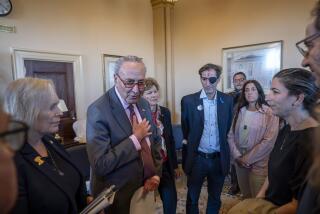Former Detainees and Other âFriends of the Courtâ Cheer
WASHINGTON â An internment camp survivor, former American prisoners of war, 175 members of the British Parliament and a group of Hungarian Jews were among those celebrating the Supreme Courtâs decision on enemy combatants Monday.
They were among about 20 individuals and interest groups who had filed amicus curiae briefs in support of detainees held at the U.S. naval base at Guantanamo Bay, Cuba.
The unusually large number of such briefs and the breadth of interested parties illustrate the high stakes involved in the case and were a reaction to the Bush administrationâs legal position, lawyers for the detainees said.
Amicus curiae, or âfriend of the court,â briefs are filed by parties that are not directly involved in the litigation but have an interest in its outcome.
âPeople began to appreciate the extreme quality of the administrationâs position,â said Joseph Margulies, who represents two Australian detainees at Guantanamo Bay. The administrationâs argument would have âallowed them to hold people indefinitely without any process, and thatâs really what people balked at.â
One of those filing a brief was Fred Korematsu, 84, who in 1944 was the first to challenge President Franklin D. Rooseveltâs executive order authorizing the detention of Japanese Americans on the West Coast. Roosevelt justified the policy as necessary for national security during wartime. Korematsu lost his case and was eventually sent to an internment camp.
In Korematsuâs brief in the Guantanamo case, his lawyers took a historical view: âThe governmentâs position is part of a pattern whereby the executive branch curtails civil liberties much more than necessary during wartime and seeks to insulate the basis for its actions from any judicial scrutiny.â
Edward Jackfert, 82, spent three years and four months imprisoned -- and mistreated, he said -- by the Japanese army in World War II. Along with two other World War II POWs, Jackfert filed a brief in support of the detainees at Guantanamo. He worries, he said, that if the United States does not abide by international rules of war, its enemies wonât either.
âI donât want any of our troops to go through what we went through,â Jackfert said.
The POWs were joined in filing a brief by 175 members of the British Parliament. The brief noted that, at the time of the filing, the United States was holding 10 British nationals, one British resident and a British refugee at Guantanamo.
William D. Rogers, a former undersecretary of State during the Ford administration, also organized 23 former diplomats to urge the court to avoid what would have been a âconstitutional disaster,â he said.
âItâs important that the U.S. stand for justice,â Rogers said. âOn the one hand, we have trumpeted to the world in recent years that we are evangelists for democracy; on the other hand, because of things like Guantanamo and [the prisoner abuse scandal at] Abu Ghraib, our image is as low as itâs ever been. Itâs affecting our capability to get things done diplomatically.â
The detainees also got support from some whose own cases could hinge on the ruling. Several Hungarian Jews seeking compensation from the government for heirlooms lost in World War II argued that they should have access to U.S. courts.
More to Read
Sign up for Essential California
The most important California stories and recommendations in your inbox every morning.
You may occasionally receive promotional content from the Los Angeles Times.











